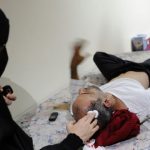The release of Ibrahim al-Demestani, a nurse imprisoned by Bahraini authorities, is the latest chapter in the government’s ongoing campaign against health professionals. While his release should be celebrated, al-Demestani should never have been imprisoned and forced to complete a three-year sentence in the first place.
As protests against repressive governments swept across the Middle East and North Africa in 2011, people living in Bahrain launched peaceful protests calling for aysh, hurriya, adala ijtima’ia, karama (bread, freedom, social justice, and dignity). The response was unequivocal: the authorities launched a forceful, bloody crackdown against the largely peaceful protesters.
A key element of this crackdown was the targeting of health professionals. As medics and doctors attempted to provide care for anyone wounded during the protests, the government systematically targeted them with threats, physical abuse, and detention. These attacks went well beyond the protests sites, extending to medical facilities as security forces militarized hospitals. In the 2011 report, Do No Harm, Physicians for Human Rights (PHR) found that doctors were threatened and beaten at Salmaniya hospital, and security forces stole ambulances and posed as medics.
Once the clouds of tear gas cleared and wounded protesters were taken to hospitals or detained by security forces, nearly 100 doctors, nurses, and other health professionals faced charges before military tribunals. Their crime was treating the injured and their conspiracy was working together to save lives. In the end, more than 50 were convicted; some served their full sentences, while others had their sentences reduced or were eventually acquitted. Al-Demestani was one of last two people in the initial group of health professionals who were imprisoned in 2011; the second, Dr. Ali al-Ekri, is still serving his sentence. Dr. Saeed al-Samahiji – who was arrested and convicted in 2014 – also remains in prison.
The health professionals detained in 2011 for fulfilling professional and ethical obligations of treating those in need of medical treatment, regardless of their political affiliation or any aspect of their identity, were deprived due process and fair trial protections.
Unfortunately, the persecution of doctors and nurses is just part of the story. As authorities in Bahrain militarized hospitals, access to health care was effectively off-limits to peaceful protesters. The government ensured that anyone considered a threat would be at risk of arrest, unlawful detention, and/or torture – even while seeking treatment at a hospital.
Furthermore, the careers of those health professionals targeted by the government have been destroyed. Many were stripped of their medical licenses, and many still remain barred from employment. This violates both their freedom of expression and their right to non-discrimination, among other rights. By decimating the ranks of people who serve the medical needs of Bahrainis, the government has also risked destroying the entire health care system.
Which brings us full circle. In Bahrain, the government has designated entire swathes of the population as effectively enemies of the state. Anyone who dares to question the government, dares to fight for human rights, dares to demand democracy is suspect. Protesters took to the streets of Bahrain asking for the fundamental rights due to every human being: freedom, social justice, dignity, and “bread,” representing a cry for basic economic security and opportunity.
Punishing health professionals for upholding the principle of medical neutrality – which calls on governments to refrain from interfering with the duties of medical professionals – and abiding by professional ethics is not confined to Bahrain. The Syrian government also cracked down on peaceful protests and attacked doctors who treated wounded protesters. As the unrest has devolved into conflict in Syria, government forces have systematically attacked hospitals and clinics, and detained, tortured, and killed health professionals.
The U.S. government has been critical of Bashar al-Assad’s government for targeting health care. However, it has been strangely quiet with regard to similar violations committed by the Bahraini government. The difference is that the United States has a close relationship with Bahrain, where the Fifth Fleet of the U.S. Navy maintains its headquarters. Such double standards with regard to respect for international human rights and humanitarian law are unacceptable. Like freedom, justice, and dignity, the independence of health professionals should be universal, and their ability to fulfill their ethical obligations should go unhindered.
The authorities in Bahrain should immediately and unconditionally release the two remaining health professionals – Dr. al-Ekri and Dr. al-Samahiji – who were wrongfully imprisoned; vacate the judgments of those who have already served their sentences; reinstate the credentials of all health professionals who were unlawfully stripped of them; and demilitarize the country’s hospitals.

